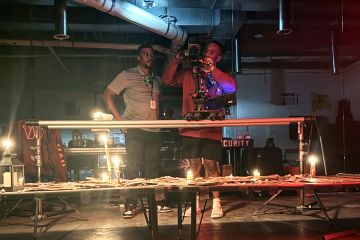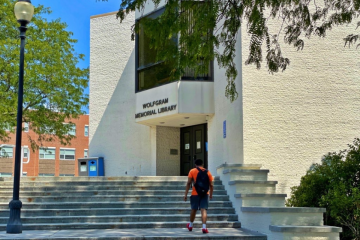Gaining Experience by Helping Others

Through his internship at a Widener-run community social work clinic, graduate student James Ross had the chance to make a real difference.
“We helped clients that were often told by others that they couldn’t be helped,” he said.
At the clinic, social work interns like Ross provide free counseling services to vulnerable adults, including people with intellectual disabilities or those at risk of homelessness. These clients have few financial resources and often nowhere else to turn.
“You get to see how you can impact a community, that the work you’re doing is really meaningful,” said Ross.
The experience also helped Ross, a 2018 graduate of Widener’s online master of social work program, apply his education and prepare him for his career as a family-based therapist.
“Working in the field and with this population helped me enhance my skills and meet clients where they are,” said Ross.
Helping fill service needs in Chester and beyond, while providing students like Ross with hands-on, practical field experience, is the goal of Widener’s community clinics and centers. Each is located on campus or nearby, and offers free or reduced-cost services.
Most of the clinics and centers provide human health assistance. These include the Biofeedback Clinic and Certification Center, Child Therapy Clinic, Community Nursing Clinic, Chester Community Clinic, Neuropsychology Assessment Center (NAC), and Social Work Counseling Services. The latter encompasses three clinic programs.
“For a university to have this many clinics and not have a medical school, I can’t think of any others like that,” said Mary Lazar, director of NAC, which conducts neuropsychological evaluations of children and adults with developmental and acquired conditions.
Widener also operates the Child Development Center, and the Small Business Development Center (SBDC).
The clinics and centers often work in concert to serve needs, and may refer clients to each other or collaborate on care. For instance, NAC may evaluate a child and recommend treatment at the Child Therapy Clinic. And through the grand rounds program, graduate physical therapy, social work, and psychology students meet to discuss cases.
“Many of us don’t just have physical needs; we have social, emotional, and mental health needs, too,” said Jill Black, interim physical therapy program director and pro bono service coordinator. “Students see and learn from each other’s different professional lenses and realize that they can best work together to help meet the multi-faceted challenges.”
At the Chester Community Clinic – one of the first student-run PT pro bono clinics in the country, and a model for others – students like doctoral candidate Justin Gilfillan ’19 help uninsured/underinsured clients recover from physical impairments. The students are supervised by licensed physical therapists, including Widener alumni.
The clinic helps us get our techniques down. It builds confidence, aids us through different experiences, and sets us apart from other schools. And it opens our eyes to the things our clients deal with. — Justin Gilfillan ’19
Delaware County resident Regina Goodrich credits the clinic, and its students, with saving her life by helping her manage chronic dizziness and other issues. Without the clinic, the community would suffer, she said. “This place brings life and happiness to people who would not have found it in other institutions.”
Housed at CityTeam in Chester, Widener’s nursing clinic likewise offers pro bono medical care to uninsured/underinsured individuals while providing students with experience in a non-hospital setting. The clinic, which is staffed by nursing faculty, students, and alumni, as well as community volunteers, treated 130 patients in the first quarter of 2018 alone.
The community’s economic health is the focus of Widener’s SBDC. Through consulting services and educational programming, SBDC helps businesses “start, grow, and prosper,” said director Lenin Agudo. Last year, the center assisted 302 clients, resulting in $13 million in capital investments.
The center is also helping Widener students gain practical experience. As part of their management capstone project, for example, students serve as business consultants for real SBDC clients.
Patriot Gumbo, an MBA student from Kenya, came to Widener specifically because of SBDC. “They’re helping the community, trying to show their clients how to go from an idea to an actual business. That’s inspiring to me.”
Now Gumbo is part of that mission, serving as an assistant business consultant. While helping clients, he’s developing the skills needed to pursue a career in international business and to realize his dream of starting his own company.



